Buhari: More promises than action!
Promises, promises and promises. This may well be the best way to sum up President Muhammadu Buhari’s performance in the health sector during his first year in office. Perhaps it may be too early to assess the government. What is clear however is that everything seems to be at the planning stage in the health sector as at May 29, the first year anniversary of this administration.
This may not be out of place. It’s just 26 days that the 2016 budget – the very first budget by the Buhari’s administration – was signed into law and exactly seven months that the health minister assumed office. There’s therefore more to assess in terms of what the government plans to achieve than any concrete achievement on ground in the health sector.
Health Minister, Prof. Isaac Adewole admitted this much during his visit to the Lagos University Teaching Hospital (LUTH) two months ago. He told journalists that the health ministry had to embark on a diagnosis of the nation’s health system following his appointment. One can therefore only assume that the minster now has a full knowledge of the numerous health challenges he has to address and there will be more to talk about in his performance in the coming years.
As he acknowledged, the first challenge remains the chronic under funding of Nigeria’s health system. “When you look at the 2013 data released by World Bank, Nigeria has the least contribution from government spending on healthcare in Africa. We were only behind South Sudan in terms of the percentage of the GDP devoted to health. Government spending on health is quite poor.”
Unfortunately the 2016 budget for health did not in any way reflect this government’s desire to make a difference in the funding of the nation’s health system. A total of N250.06 billion was allocated to health, with recurrent expenditure of N221.412 billion and capital expenditure of N28.650 billion – a paltry 4.16% of the total budget. It is yet to be seen however, how the continued poor funding of the health sector will give expression to some of the initiatives being planned by the government,
The minister has also promised a revitalisation of the nation’s primary health care in the coming years saying the Buhari government will ensure that over 10,000 primary healthcare centres (PHCs) become functional between 2016 and 2017.
“There are about 30,000 PHCs in the country. Only 20% are working. Some are uncompleted, some are dilapidated, some are overgrown with weeds but what we plan to do is to make functional 10,000 of these 30,000 in the next two years. We have submitted the proposal to the presidency and it is under review. Once it is approved, in the next three months starting from May 1, we want to revitalise 110 centres on the basis of one healthcare centre per senatorial district. That will give us one hundred and 109 and one for Fuka village in Jos, where lassa fever started… the plan is to do half this year and the remaining half next year. So, towards the end of 2017, Nigerians will begin to see the dividends of our efforts. I’m appealing to Nigerians to be patient,” Adewole said.
The government has also promised to implement the National Health Act, promulgated towards the end of the Jonathan administration. The Act provides a framework for the regulation and provision of national health services, defines the rights of health workers and users, and stipulates guidelines for the formulation of a national health policy. Specifically, the Act provides for Free Medical Care for children under 5 years old, pregnant mothers, the elderly (above 65) and disabled people; A guaranteed basic minimum health package for all Nigerians; Universal acceptance of accident cases by all Health facilities in Nigeria (Public and Private) and Ensured quality of healthcare services through the issuance of Certificates of Standard (Public and Private) among other benefits.
It is generally agreed by stakeholders that the National Health Act has provided a good ground for the Buhari administration to take health care delivery to an unprecedented level in the country, if fully implemented. This however is certainly not in the first year just gone by.
The government has also promised to embark on infrastructural development in the health sector, obviously in the coming years. No doubt, there have been efforts by past governments, especially the last two administrations, to upgrade existing federal health infrastructure and equipment with the aim of improving the capacity of the Federal Tertiary Health Institutions. If continued, health care delivery will certainly fare better under the Buhari administration.
The Universal Health Coverage in Nigeria through the National Health Insurance Scheme still remains very low and less than 10%. Unfortunately, not much has been heard about government’s plan to expand the scope of NHIS in the Buhari administration.
There was however some good news during the president’s first year in office. Top of this is the delisting of the country from the polio endemic countries by the World Health Organisation (WHO). In delisting Nigeria, WHO noted that the country did not record any new case of polio virus for 14 consecutive months. If this continues, the nation is expected to be certified s polio-free in less than two years time. The president has promised that the country will not be complacent and will ensure that the war against polio is finally won.
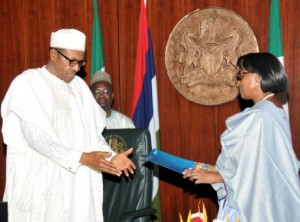
• WHO Regional Director for Africa, Dr Matshidiso Rebecca Moeti presenting the WHO certificate delisting Nigeria from polio-endemic countries to President Buhari.
Luckily, the 2016 budget has reflected the government’s determination. The sum of N12.6 billion was allocated for vaccines, devices and operations programmes for polio, measles, and yellow fever etc.
And the bad news: The Global Fund to Fight HIV/AIDS, Tuberculosis and Malaria has suspended payments to Nigeria over evidence that $3.8 million was diverted by some health workers and consultants. The missing money is 95 per cent of the amount budgeted to implement, administer and train users of a web-based reporting platform. According to the report, only a fraction of the $1.4 billion of the fund has been spent fighting AIDS, malaria and tuberculosis in Nigeria — the fund’s largest recipient since 2003.
Considering that Nigeria has the world’s second highest number of people infected with HIV/AIDS after South Africa, that the country accounts for one-third of all deaths from malaria in Africa and is also among the top 22 countries with tuberculosis patients, the second most infectious cause of death in the world, the development is no doubt an embarrassing setback for Nigeria, still being derided as a leading corrupt nation in the world.
Certainly, Buhari’s anti-corruption searchlight is expected to beam copiously on the health sector in the coming years even as the nation expects a better performance from his government.
About author
You might also like
Cholera outbreak declines
• NCDC attributes major cause to poor water and hygiene facilities in many States The Nigeria Centre for Disease Control (NCDC) says there has been a general decline in
Killer Cough Syrup: India shuts production Company
India on Wednesday ordered the closure of company behind killer cough syrups in Gambia The government ordered Maiden Pharmaceutical Limited to stop manufacturing all drugs with immediate effect after the
Update: Nigeria gears up for Ebola
Health Minister Inspects Abuja airport health facilities, says “Don’t panic” Screening of inbound passengers commences at international airports NCDC conveys stakeholders meeting, inaugurates Ebola Preparedness Working Group (EPWG) WHO Regional


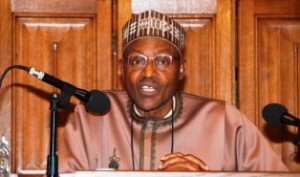
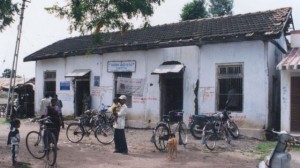
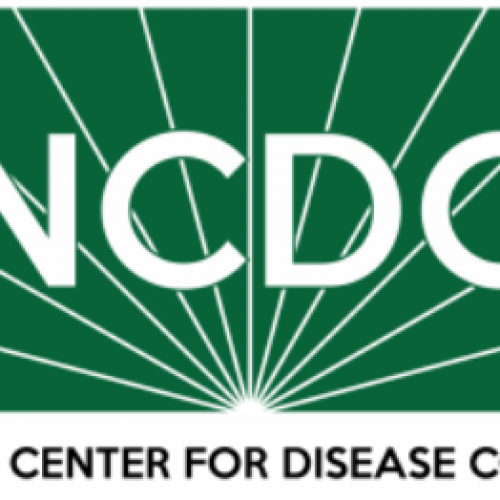

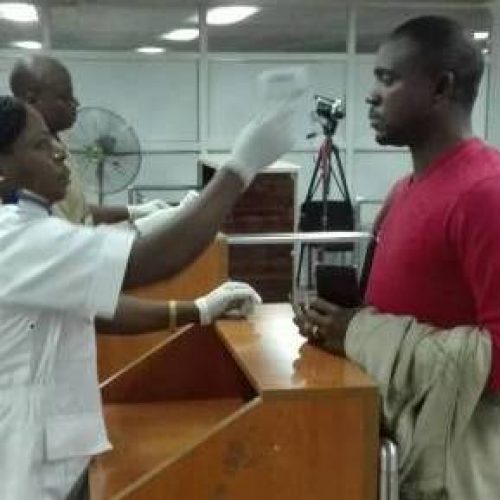


0 Comments
No Comments Yet!
You can be first to comment this post!